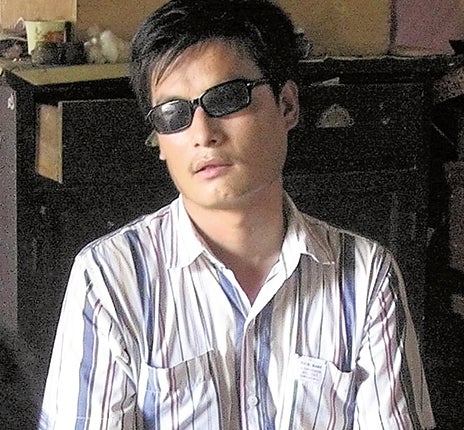Blind activist freed from jail – but China is still watching

Your support helps us to tell the story
From reproductive rights to climate change to Big Tech, The Independent is on the ground when the story is developing. Whether it's investigating the financials of Elon Musk's pro-Trump PAC or producing our latest documentary, 'The A Word', which shines a light on the American women fighting for reproductive rights, we know how important it is to parse out the facts from the messaging.
At such a critical moment in US history, we need reporters on the ground. Your donation allows us to keep sending journalists to speak to both sides of the story.
The Independent is trusted by Americans across the entire political spectrum. And unlike many other quality news outlets, we choose not to lock Americans out of our reporting and analysis with paywalls. We believe quality journalism should be available to everyone, paid for by those who can afford it.
Your support makes all the difference.A blind activist jailed after highlighting the plight of women in his area, including forced abortions and other abuses, was released from a Chinese prison yesterday but remained under heavy surveillance.
Chen Guangcheng, 39, was imprisoned in 2006 on what supporters said were trumped-up charges of disturbing the peace and traffic offences. His case marked the start of a government crackdown on activist lawyers.
He was escorted back to his village in the eastern province of Shandong yesterday, where his family has been under intense scrutiny for several days, and 24-hour CCTV cameras have been set up in the village to monitor the family's movements.
Mr Chen was jailed after he wrote a report about the status of women in his local area of Linyi, a region with some 10 million residents, which revealed how family-planning officials there enforced China's one-child policy.
The report said that tens of thousands of people who had an illegal number of children and were ineligible to have any more were compelled to undergo late-term abortions, with others forcibly sterilised. The report included accounts of men arrested while their wives were forced to abort eight months into their pregnancies.
The Chinese government says no one is physically forced not to have children and says that since the policy was introduced, China has prevented over 400 million births.
However, in Linyi the rules were applied particularly stringently by officials who needed to keep within quotas so they did not get black marks on their performance records. The central government launched an investigation and a small number of officials were punished, but Mr Chen was arrested after the report's publication and he was jailed for four years and three months for "deliberately destroying public property and assembling a crowd to disrupt traffic".
Activists in China routinely face such post-detention restrictions, referred to as "ruan jin" or "soft detention" by the police.
"For some Chinese activists, the end of a prison term is just the beginning of a life-long sentence of police surveillance and harassment," said Sophie Richardson, acting Asia director at the rights group Human Rights Watch. "The Chinese government has a chance to demonstrate real respect for the rule of law by ending its persecution of Chen and his family."
His wife, Yuan Weijing, who was waiting to meet him with their two small children, has had her freedom of movement restricted since he was detained and she has been beaten up on one occasion. His lawyer, Teng Biao, spoke to him briefly yesterday and said that, even though he was out of prison, the family was surrounded by security officers. Mr Chen's health has suffered during his time in prison, his relatives said, because he was not given the right medication for his ailments.
Mr Chen's story is of trying to find his way in a system that worked against him. He went blind as a child and is a self-taught lawyer, who was not allowed to graduate in Shandong province because of his disability. He listened in on classes and, like many so-called "barefoot lawyers", he uses what skills he has to represent villagers. He maintained that he was only trying to force local officials to abide by the rights enshrined in China's constitution, but his activism brought him into conflict with the authorities.
"We are thrilled that he is finally released. He should never have been imprisoned in the first place. He committed no crime and we will monitor closely now to see if he is put under heavy surveillance now he is free," said Corinna-Barbara Francis from the China team of Amnesty International.
Join our commenting forum
Join thought-provoking conversations, follow other Independent readers and see their replies
Comments